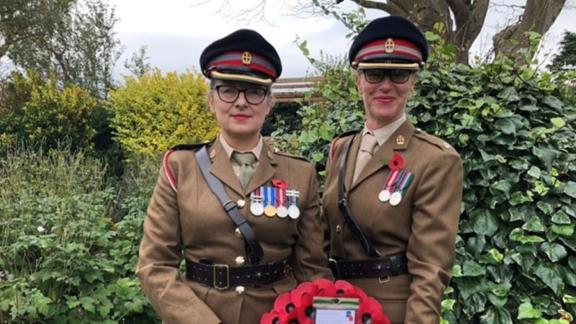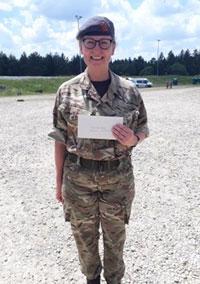Balancing reservist duties and midwifery: Roz McMeeking's story

I trained as a nurse in Furness General Hospital and Westmorland County Hospital 1988-91 and as a midwife in Halifax from 1992-93. In 1993, I joined Queen Alexandra's Royal Army Nursing Corps and was commissioned in Aldershot.
I was posted to British Military Hospital Rinteln, a gorgeous little town in northern Germany. I was a newly qualified midwife in the rank of Lieutenant and worked with some amazing midwives who passed on some great knowledge and skills. By the time I left in 1996, I was a Captain and I transferred to the Army reserves.

I am still in the Army reserves in 306 Hospital Support Regiment. Along with a colleague in the unit, we represent University Hospitals of Morcambe Bay NHS Foundation Trust (UHMBT) and the unit regarding NHS/military engagement. We have recently written the job descriptions for midwives in the military and created a defence nursing competency for midwives on operations. Midwives have a range of transferable skills that can be used in general settings, such as resuscitation, observations, theatres and recovery.
My current role in the NHS is as a clinical governance business partner, but recently I went back to work in maternity for a few weeks to update my clinical skills because of the COVID-19 pandemic. It was an absolute joy to return to midwifery and I was extremely impressed by the maternity care given at Royal Lancaster Infirmary during COVID-19. I am now in a better position to inform my midwifery role in the reserves and continue to do some bank shifts for the teams.
I continue to be proud to be a nurse and a midwife at UHMBT, where I started my nursing career, and probably where I will end my career, still proud to be an Army midwife.
How does the trust support reservists in its organisation?
- UHMBT pledges its support to members of the Reserve Forces by offering two weeks additional paid leave for the purposes of annual continuous training camp.
- The trust recognises the benefits to the organisation of the excellent training undertaken by reservists. The trust supports its reserves by enabling the development of skills and abilities that are of benefit to both the reservist and the NHS organisation.
How has the trust benefitted from supporting me and other reservists?
- Military training has continued virtually during the COVID-19 pandemic, which has meant that I have had the opportunity to continue with my reservist training, offering support for my overall mental and physical wellbeing. Reservists were encouraged to keep fit and healthy by having Lone Soldier physical training sessions, completing at least eight hours of personal training sessions per month, with a unit WhatsApp group providing moral support and encouragement. At a time when NHS organisations are experiencing considerable workforce pressures, being able to maintain a good level of physical fitness has meant that I have been able to continue in my role in governance but also return temporarily to a clinical midwifery role and now subsequently work flexible shifts with the NHS staff bank.
- The military has supported me in developing my NHS career in clinical governance, funding my level six module in health care governance, and providing training through Health Care Quality Quest, in health care governance and quality improvement.
- As a commissioned officer with 306 Hospital Support Regiment, transferable skills such as associated leadership are second to none. The diverse training provided by the military not only encourages group support and team working but also for you to push yourself and step outside of your comfort zone to complete something you would never have done otherwise.
“Being a Reservist at UHMBT is seen as something to be proud of and the support I receive is superb”. Roz McMeeking - Clinical Governance Business Partner”



